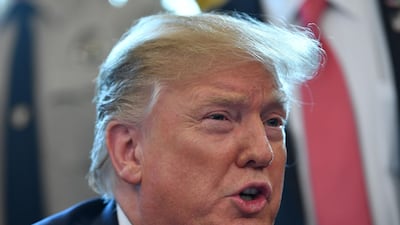Donald Trump is once again under fire for failing to clearly denounce white supremacist ideology as a global threat after the New Zealand terror attack on Friday.
“I think it’s a small group of people that have very, very serious problems,” the US president said on the day of the attack when asked about the ideology of white supremacists that inspired attacker. The Trump administration, except for National Security Adviser John Bolton, has refrained from using the term “terrorism” in describing the attack and the attacker. Mr Trump has also not used the word “Muslim” in his response to the attack, despite the targets being Muslims at their place of worship.
This vagueness, despite a US intelligence report that said white supremacists had carried out more attacks in the US than any another other group since 2003, is raising questions about Mr Trump’s strategy in addressing such threat.
White House chief of staff Mick Mulvaney pushed back against any talk that the US president was anti-Muslim, telling CBS on Sunday: "I don't think anybody could say that the president is anti-Muslim."
But Mr Trump’s half-hearted condemnation of white supremacist ideology throughout his political rise, and defence on Sunday of a Fox News host, Jeanine Pirro, who was suspended because of Islamophobic comments, are putting his views about Muslims into question.
Shibley Telhami, a senior fellow at the Brookings Institution and director of the University of Maryland's Critical Issues Poll, told The National that Mr Trump’s wording on the issue was directly tied to his electoral base.
“We [the polling centre] have been studying Donald Trump’s views and those of his constituency since 2015 and the beginning of the campaign,” Mr Telhami said.
He said one poll by Critical Issues found that those in the Republican Party with the most unfavourable views of Muslims gravitated mostly towards Mr Trump.
"There is no question that Mr Trump is tapping into something that appeases his supporters … white supremacists are a cornerstone of that support,” Mr Telhami said.
Mr Trump’s low approval ratings and the cloud of legal troubles that surround him and his family arising from the Mueller probe only make him more dependent on his electoral base, he said. “He needs this constituency more than ever before in order to push back on what is shaping up to be tremendous pressure from the Mueller investigation … it is a deliberate strategy because he needs his core supporters.”
Defenders of the US president however, pointed to the media bias and lack of objectivity in covering Mr Trump. Joel Pollak, a conservative host, said Mr Trump had already denounced white supremacy but this had been ignored by the media. “He gets no credit whatsoever for doing the right thing. It makes no difference,” he wrote on Twitter.
David Reaboi from the Security Studies Group also accused the media of unfair coverage. “While the media absurdly blames Trump for the NZ attack, Erdogan led a call to arms on behalf of revenge — will he be blamed for a Turk in the Netherlands heeding his call?” Mr Reaboi tweeted.
For now, Mr Trump continues to set his own standards in both responding to shootings and communicating with supporters. It is an approach that helped him win the presidency in 2016, and there are no signs of him changing track now.

